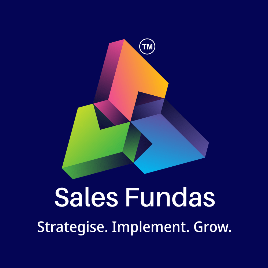The Fine Line Between Success & Failure in Sales!
- Jayant Kelkar

- Jun 12, 2023
- 6 min read
Updated: Nov 27, 2024

In the world of sales, there exists a delicate balance between engaging with potential customers and driving them towards making a purchase. This fine line between sales engagement and sales advances is crucial for businesses to understand and navigate.
By effectively managing this balance, sales professionals can foster meaningful relationships with prospects while also driving revenue growth. In this article, we will explore the importance of finding the equilibrium between engagement and advancing the sales process.
While they may sound similar, they represent distinct stages in the sales process.
Understanding the difference between sales engagement and sales advances is essential for sales professionals aiming to optimize their strategies and improve overall sales performance. In this article, we will explore the fine line between these two concepts and delve into strategies to strike the right balance.
1. Defining & understanding the difference between the Sales Engagement and Sales Advances
Before delving deeper into this topic, it's essential to establish a clear understanding of the terms "sales engagement" and "sales advances" and the differences between them.
A. Sales Engagement: Building Relationships and Trust
Sales engagement refers to the interactions and activities that take place between a salesperson and a potential customer during the early stages of the sales cycle. Its primary objective is to build relationships, establish trust, and create a strong foundation for future business opportunities. Sales engagement focuses on initiating conversations, understanding customer pain points, and providing valuable information to prospects.
During the sales engagement phase, it is essential to prioritize the customer's needs and tailor the sales approach accordingly. This involves active listening, asking relevant questions, and demonstrating expertise to address customer concerns effectively. Sales engagement also involves nurturing leads through various channels such as email, phone calls, social media, and in-person meetings. These interactions aim to keep the prospect engaged and interested in the offered products or services.
The Importance of Sales Engagement
Sales engagement forms the foundation for successful sales advances. Without engaging potential customers effectively, it becomes challenging to progress towards closing a deal. Here's why sales engagement is vital:
a) Building Trust: Engaging with prospects allows sales professionals to build trust and credibility. By understanding their needs and providing relevant information, salespeople can position themselves as trusted advisors. Trust is crucial for customers to feel confident in their purchasing decisions.
b) Understanding Customer Needs: Engaging with customers enables sales professionals to gain a deep understanding of their pain points, desires, and preferences. By actively listening and asking relevant questions, salespeople can tailor their approach and demonstrate how their offering addresses the specific needs of the customer.
c) Differentiation: Effective engagement allows sales professionals to differentiate their product or service from competitors. By highlighting unique value propositions and demonstrating expertise, salespeople can position themselves as the preferred choice in the market.
d) Relationship Building: Engaging with prospects nurtures relationships that can lead to long-term business opportunities. Even if a deal doesn't materialize immediately, maintaining a positive and ongoing connection can open doors for future collaborations or referrals.
B. Sales Advances: Moving Towards Closing the Deal
Sales advances, on the other hand, occur when the sales process progresses from the initial engagement stage towards closing a deal. At this stage, the salesperson aims to convert the prospect into a paying customer by presenting a compelling solution that addresses their specific requirements. Sales advances involve providing detailed product information, offering tailored solutions, and highlighting the unique value proposition of the products or services being sold.
To successfully achieve sales advances, sales professionals need to showcase the benefits and features of their offerings that align with the customer's needs. This involves presenting persuasive arguments, providing case studies or testimonials, and offering competitive pricing and terms. Additionally, building a sense of urgency can help expedite the decision-making process and encourage prospects to take the desired action.
The Role of Sales Advances
While sales engagement lays the groundwork, sales advances are crucial for converting prospects into paying customers. Here's why sales advances are essential:
a) Moving Towards Conversion: Sales advances provide a clear path towards closing a deal. By proactively guiding the customer through the buying process, salespeople can reduce friction and facilitate the final decision-making steps.
b) Addressing Objections: Sales advances give an opportunity to address any objections or concerns that potential customers may have. By providing relevant information and addressing their doubts, salespeople can overcome barriers and increase the chances of a successful conversion.
c) Creating Urgency: Sales advances often involve creating a sense of urgency or highlighting the value of acting promptly. By emphasizing limited-time offers, exclusive discounts, or impending deadlines, salespeople can motivate prospects to make a buying decision sooner rather than later.
d) Securing Commitment: Ultimately, sales advances aim to secure a commitment from the customer to purchase the product or service. This may involve negotiating terms, finalizing contracts, or arranging a payment plan. Closing the deal is the final step towards revenue generation.
2. Differentiating Sales Engagement and Sales Advances
While sales engagement and sales advances are interconnected, they serve distinct purposes within the sales process. Sales engagement focuses on building rapport, trust, and understanding customer pain points. It lays the groundwork for establishing long-term relationships and nurturing leads, often involving multiple touchpoints and interactions. On the other hand, sales advances concentrate on moving the sales process forward, with the goal of closing a deal and generating revenue.
The key differentiator lies in the objectives and strategies employed during each phase. Sales engagement emphasizes education, relationship-building, and addressing customer concerns, while sales advances emphasize value proposition, differentiation, and closing techniques. Both aspects are crucial for achieving sales success, and a well-balanced approach that seamlessly transitions from engagement to advances is essential for sustainable growth.
3. Strategies for Optimizing Sales Engagement
To enhance sales engagement and increase the likelihood of sales advances, sales professionals can employ several strategies:
a) Personalization and Targeting - Tailoring sales engagements to individual prospects based on their preferences, needs, and pain points can significantly increase engagement. By demonstrating a genuine understanding of the prospect's unique challenges, sales professionals can establish credibility and foster stronger connections.
b) Value-Oriented Communication - Engaging prospects with valuable and relevant information positions the sales professional as a trusted advisor. By providing insights, industry trends, and solutions to the prospect's pain points, sales professionals can demonstrate expertise and build credibility.
c) Active Listening - Listening attentively to prospects allows sales professionals to gather crucial information about their needs, preferences, and objections. By actively addressing these concerns, sales professionals can overcome barriers and create a more personalized and persuasive sales experience.
d) Building Relationships - Investing time and effort in building relationships with prospects is essential for long-term success. Engaging with prospects beyond the initial sale, maintaining regular communication, and providing ongoing support fosters customer loyalty and increases the likelihood of repeat business.
4. Strategies for Maximizing Sales Advances
To optimize sales advances and increase conversion rates, sales professionals can implement the following strategies:
a) Qualifying Leads - Effectively qualifying leads ensures that sales professionals focus their efforts on prospects with a higher likelihood of making a purchase. By identifying key criteria and using qualification frameworks, sales professionals can prioritize their time and resources for prospects that have the highest potential for sales advances.
b) Offering Value-Based Solutions - Positioning products or services as solutions to the prospect's specific pain points increases the likelihood of sales advances. By highlighting the unique value proposition and aligning it with the prospect's needs, sales professionals can present compelling reasons to move forward with the purchase.
c) Overcoming Objections - Addressing and overcoming objections is a critical step in the sales process. By understanding and empathizing with the prospect's concerns, sales professionals can provide relevant information, clarify misconceptions, and alleviate doubts. Effective objection handling builds trust and confidence in the sales professional and the proposed solution.
d) Creating a Sense of Urgency - Instilling a sense of urgency can motivate prospects to take immediate action. Limited-time offers, exclusive incentives, or highlighting potential benefits gained by making a prompt decision can encourage prospects to move forward with the sales process.
Conclusion
In the realm of sales, finding the delicate balance between engagement and advancing the sales process is key to driving business growth. Sales engagement builds trust, understanding, and relationships with potential customers, while sales advances move them closer to making a purchase.
By understanding the differences and employing effective strategies for each phase, businesses can optimize their sales approach, create meaningful connections with customers, and ultimately drive success in a competitive marketplace.
Remember, it's the harmonious combination of engagement and advances that unlocks the potential for sustainable sales growth.




Kommentarer